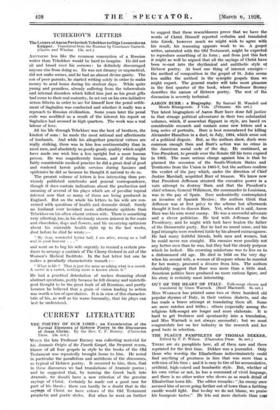CURRENT LITERATURE
WHEN the late Professor Burney was collecting-material for
his Aramaic Origin of the Fourth Gospel, the frequent resem. 131lance of all four gospels in style to the books of the Old Testament was repeatedly brought home to him. He noted in particular the parallelism and antithesis of the discourses, so typical of Hebrew poetry. It occurred to him, then, that in these discourses we had translations of Aramaic poems ; and he suggested that, by turning the Greek back into Aramaic, we should have a new criterion of the genuine sayings of Christ. Certainly he made out a good case for part of his thesis ; there can hardly be a doubt that in the sayings of Christ we have echoes of the Old Testament prophetic and poetic styles. But when he went on further to suggest that these resemblances prove that we have the words of Christ Himself reported verbatim and translated into Greek, however much we might wish to agree with his result, his reasoning appears weak to us. A gospel writer, saturated with the Old Testament, might be expected to reproduce something of its form ; and from just this fact it might as well be 'argued that all the 'sayings of Chrid have been re-cast into the rhythmical and antithetic style of Hebrew poetry. At least one thing of interest emerges— the method of composition in the gospel of St. John seems less unlike the method in the synoptic gospels than we might expect. The general reader will take most pleastire in the first quarter of the book, where Professor Burney describes the nature of Hebrew poetry. The rest of the discussion is severely technical.






































































 Previous page
Previous page